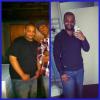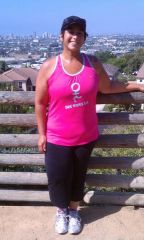Search the Community
Showing results for 'revision bypass'.
Found 17,501 results
-
Let's see, I added several things to make shakes more palatable!! You can use SF/FF pudding (use very little, it WILL thicken!!!), peanut butter, and fresh fruit. You can use the DaVinci or Torani SF syrups---they helped me a lot!!!! They have some new flavors of the SF/FF coffee creamers out for the holidays. Hersheys makes a SF chocolate syrup, for like chocolate milk, or ice cream topping, it is pretty good, and easy to use for shakes. You can use orange juice concentrate, for an Orange Julius type of drink. It is not a pleasant diet...and in some ways it gets harder, but other ways it will get easier. The taste may never be something you can enjoy...sorry. But the cravings for carbs, and sugars will ease as you get into the diet by several days. And the simplicity of it, will eventually be a good thing. But the thing that finally kicked in and made all the pre-op and post op dieting worth while was seeing the weight dropping--quickly!!! In the meantime, stay busy doing things, and just take your shake with you, and begin practicing the sipping as opposed to guzzling it just to get it finished ( I remember thinking that would help!!), sip and as wierd as it sounds, after the drink breath out with your mouth open (if you are home and alone...publicly it might not be too good of an idea!!), it will ease the aftertaste of some of the drinks. You can also especially at this point use a straw if that is the only way you can drink them, and put the straw further back on your tongue, bypassing some of the sweet tasting tastebuds on your tongue. Soon all this will be a mere memory, and you will be doing what you can to help someone else through it. Tis hard, but oh so worth it!!! Hang in there!!! Welcome to LBT!!! Kat
-


Choosing surgeons and ins requirements
juno5 posted a topic in PRE-Operation Weight Loss Surgery Q&A
I just started taking the first steps in this journey to a new me. I have some roadblocks already. 1) The surgeon at the hospital that I work at is leaving in September. The surgeon who is replacing him has been working alongside the current surgeon doing bariatric surgeries. He has experience as a surgeon but the wls are a bit newer to him. He hasn't been performing on his own yet. If I go to the hospital I work with (and my ins approved me for wls) then I have better ins coverage. Or...I can go to the surgeon at a neighboring hospital and still be covered but not as much. More experienced there too....what should I do??! 2) my ins requires a 2 year history of documented weights/BMI. I've never been one to go to a pcp...I don't even have one. I do have a long standing history with my obgyn...(i've had 5 kids.) My last appt was in March to have my iud removed due to my concerns with the wgt gain and mood swings I had from it....prior to that was almost 2 years ago when I gave birth to baby #5. That's it. That would be all I have for medical history. How do I know of my ins will accept this? Or are they just going to say I have "baby wgt" and need to eat better and exercise? In so stressed about this. I have an appt with the hospital down the road who will cost more and ins doesn't cover as well with them...but I also am registered for the seminar at my hospital that provides my ins at the end of June... Any advice or knowledge about the 2 year recorded weights? Or about choosing the right hospital? I did make an appt to start seeing a pcp. They got me in for June 1st. I want this surgery so bad. I'm 31 and I feel like I'm 60. My feet hurt like someone is crushing them all the time. I'm tired. Its depressing. I want to be able to run around with my kids and not have to tell them "later" all the time. My mom had bypass surgery 13 years ago. Obesity is very prevalent in my family as is DM2 and heart disease. I'm not on a good track right now...I need this tool to help me get where I want to be. -
I'm sure there are some really good ones out there, I just don't personally know of any I don't think. There is the "egg face" one with all of the recipes if that is what you are looking for. Or there is one if you search "I'mPercfect Life" on facebook....it is gastric bypass and fitness related more than recipes/ideas, etc. That's all I really know of off hand other than personal blogs like the one I have that I have used to document my journey. Were you looking for something specific?
-


Must Read! How the Lap band "SHOULD work" "Green Zone" in fills
NaNa posted a topic in LAP-BAND Surgery Forums
Hello... I thought I would post this must read article by the surgeon who invented the "Green Zone" and how the band should "ideally work".... http://bariatrictime...1/#comment-2133 Gastric Banding and the Fine Art of Eating BT Online Editor | September 22, 2011 by Paul O’Brien, MD Dr. O’Brien is from the Centre for Obesity Research and Education (CORE), Monash University, Melbourne, Australia. Bariatric Times. 2011;8(9):18–21 Funding: No funding was received for the preparation of this article. Financial Disclosure: Dr. Paul O’Brien is the Emeritus Director of the Centre for Obesity Research and Education (CORE) at Monash University, which receives a grant from Allergan for research support. The grant is not tied to any specified research projects and Allergan has no control of the protocol, analysis and reporting of any studies. CORE also receives a grant from Applied Medical toward educational programs. Dr. O’Brien has written a patient information book entitled The Lap-Band Solution: A Partnership for Weight Loss, which is given to patients without charge, but some are sold to surgeons and others for which he receives a royalty. Dr. O’Brien is employed as the National Medical Director for the American Institute of Gastric Banding, a multicenter facility, based in Dallas, Texas, that treats obesity predominantly by gastric banding. Abstract The author reviews the physiology of eating and what the adjustable gastric band does to the function of the distal esophagus and upper stomach of the patient. The author also provides the “Eight Golden Rules” on proper eating habits for patients of laparoscopic adjustable gastric banding, including what, when, and how they should eat, in order to achieve optimal weight loss results. Introduction Laparoscopic adjustable gastric banding (LAGB) has been shown to enable patients with obesity to achieve substantial, durable, and safe weight loss,[1,2] which can help reduce or resolve multiple diseases,[3] improve quality of life, and prolong survival in patients with obesity.[4] LAGB is a weight loss surgical procedure performed solely for the purpose of affecting a key physiological function in weight loss, appetite control. In 2005, we conducted a randomized, blinded, crossover trial that showed that the LAGB controls the appetite.[5] However, if the LAGB is not placed properly or if the patient does not eat properly, it will not perform at an optimal level. For example, if the band is placed too loosely, then it will not provide the proper level of reduced satiety and appetite, and likely will have little effect on the patient’s weight and health. If the band is placed too tightly or if patient eats too fast or takes large bites of food, slips and enlargements can occur, leading to reflux, heartburn, vomiting, and sometimes the need for revision. Optimally, the band should be adjusted so that it squeezes the stomach at just the right pressure. If the patient eats correctly and the band is placed correctly, the LAGB should adequately control the patient’s appetite, resulting in optimal weight loss. The Physiology of LAGB Dr. Paul Burton, a bariatric surgeon at the Centre for Obesity Research and Education, Melbourne Australia, has studied the physiology and the pathophysiology of the LAGB closely. He used high-resolution video manometry, isotope transit studies, endoscopy, and contrast imaging to understand what happens during eating in normal controls, eating in patients who are doing well after LAGB, and eating in patients who have symptoms of reflux, heartburn, and/or vomiting after LAGB.[7–15] In Burton’s series of articles, he concluded that in LAGB, it is not the band that fails, but rather the patients who receive the band and, more importantly, the doctors who care for them. Many years ago at the Centre for Obesity Research and Education (CORE), my colleagues and I developed the Green Zone chart, a conceptual way of identifying the optimal level of band restriction (Figure 1). When a patient is in the yellow zone, it is an indication that the band is too loose. When in the yellow zone, a patient may be eating too easily, feeling hungry, and not losing weight. When a patient is in the green zone, he or she does not feel hungry, is satisfied with small amounts of food, and is achieving weight loss or maintaining a satisfactory level of reduced weight. When a patient is in the the red zone, it is an indication that the band is too tight. The patient experiences reflux, heartburn, and vomiting. The range of food the patient in the red zone can eat after undergoing LAGB is limited and he or she may start to eat abnormally (so-called maladaptive eating), favoring softer, smoother foods like ice cream and chocolate. While in the red zone, patients will not lose weight as effectively and they may even gain weight. Burton measured the pressure within the upper stomach beneath the band in numerous patients when they were in the green zone. He found the optimal pressure was typically 25 to 30mmHg. The art of adjustment is to find the level of Fluid in the band that achieves that pressure range. That level of pressure generates a background sense of satiety that persists throughout the day. The patient, when correctly adjusted, normally will not feel hungry upon waking in the morning, and throughout the day should feel much less hungry than he or she did before band placement. In my experience, it is common for LAGB patients to have no feeling of hunger in the morning. Then, during the day, a modest level of hunger will develop, which a small meal should satisfy. One of the key lessons learned from Burton’s studies was that each bite of food should pass across the band completely before another bite is swallowed. There is no pouch or small stomach above the band and there should never be food sitting there waiting. The esophagus is a powerful muscular organ that typically generates pressures of 100 to 150mmHg, but it is capable of generating pressures above 200mmHg. Esophageal peristalsis squeezes the bite of food down toward the band and then progressively squeezes that bite across the band. Each bite must be squeezed across the band before the next bite starts to arrive. Figure 2 shows a bite in transit across the band. A single bite of food, chewed well until it is mush, will move down the esophagus by peristalsis. At the level of the band, the esophageal peristalsis will squeeze that bolus of food across the band. It takes multiple squeezes (usually 2–6 squeezes or peristaltic waves) to get that bite of food across in a patient with a well-adjusted band (Figure 2). Those squeezes generate a feeling of not being hungry and stimulate a message that passes to the hypothalamus to indicate that no more food is needed. If a single bite of food is able to generate between two and six waves of signal, a meal of 20 bites may generate 100 or more signals. This is enough to satisfy a person and is enough to signal him or her to stop eating. We recognize two terms for appetite control, satiety and satiation. Satiety refers to the background control of hunger that is present throughout the day regardless of eating. In the LAGB patient, satiety is generated by the band exerting a constant compression on the cardia. Satiation is the early control of hunger that comes with eating. In the LAGB patient, satiation is generated by the squeezing of the bolus of food across the band during a meal. Each squeeze adds to the satiation signal. There are sensors in the cardia of the stomach that detect this squeezing. The exact nature of these sensors is still to be confirmed but they must be either hormonal or neural. We know that satiety and satiation are not mediated by one of the hormones currently known to arise from the upper stomach.[16] Ghrelin is a hormone that stimulates appetite. A number of hormones that can be derived from the cardia of the stomach are known to reduce appetite. None of these hormones are found to be raised in the basal state after gastric banding and none can be shown to rise significantly after each meal.[16] Vagal afferents are plentiful in the cardia, and one group of afferents has a particular structure that lends itself to recognizing the compression of the gastric wall associated with squeezing of the bite of food across the band. In my opinion, the intraganglionic laminar endings, better known as IGLEs, are the most likely candidate as mediator of the background of satiety throughout the day and the early satiation after a meal. The IGLEs lie attached to the sheath of the myenteric ganglia and are known to detect tension within the wall of the stomach. They are low-threshold and slowly adapting sensors and therefore are optimal for detecting continued compression of cardia of the stomach over a 24-hour period. The several squeezes that go with the transit of each bite stimulate the IGLEs further. The signal passes to the arcuate nucleus of the hypothalamus and the drive to eat is reduced. The lower esophageal contractile segment. Burton developed the concept of the lower esophageal contractile segment (LECS). It is made up of four parts: the esophagus, the lower esophageal sphincter, the proximal stomach (including the 1cm or so above the band and the 2cm of stomach behind the band), and the band itself (Figure 3). As the esophagus squeezes the bolus of food down toward the band, the lower esophageal sphincter relaxes as this peristaltic wave approaches. It then generates an after-contraction, which can maintain some of the pressure of the peristaltic wave as a part of the food bolus is squeezed into that small segment of upper stomach. The upper stomach, including the area under the band, is sensitive to these pressures. It generates signals to the hypothalamus. These signals may be hormonal but are more likely to be neural. A correctly adjusted band will generate a basal intraluminal pressure of 25 to 30mmHg, providing a resistance to flow. The segment of the bolus that is squeezed through generates more signals from that area. Keeping the LECS intact is a key requirement for success with the gastric band. Bad eating habits (e.g., insufficient chewing, eating too quickly, taking bites that are too large) hurt the LECS. If those bad habits go on for long enough, stretching occurs and the power of peristalsis is lost, leading to the return of hunger (Figure 4).[11,12] The Fine Art of Eating A quality aftercare program is essential to successful weight loss in patients after LAGB. Before making the decision to proceed with LAGB in patients, I promise my patients three things: 1) to place the band in the optimal position safely and securely, 2) that they will have permanent access to a skilled aftercare program, and 3) that I will give them the information they need to obtain the best possible weight loss from the band. In return, I ask for three commitments from my patients: 1) that they follow the rules regarding eating after undergoing the procedure, 2) that they follow the rules regarding exercise and activity, and 3) that they always come back for follow up no matter how many years have passed.[6] The “Eight Golden Rules.” At my facility, we summarized guidelines for eating after LAGB into what we call the “Eight Golden Rules” (Table 1). These rules are included in a book and DVD given to every patient who undergoes LAGB at the facility.[6] The rules are also posted on www.lapbandaustralia.com.au and are reinforced at most aftercare visits. These eight golden rules must become part of each patient’s life. The effect of the LAGB procedure on hunger facilitates a patient’s adherence to the rules, making it more likely that he or she will follow them. However, achieving positive results with LAGB requires a working partnership between the physician and patient. Adhering to these rules is the patient’s part of the partnership, and he or she ultimately is responsible for the success or failure of weight loss following LAGB. What to eat. After undergoing LAGB, patients should eat small amounts of “good food,” meaning food that is Protein rich, of high quality, and in solid form. Each meal should consist of 125mL or 125g (i.e., about half of a cup of food). This measure of “half a cup” is a concept rather than a real measure of food, as some foods, such as vegetables and fruit, are composed largely of Water and this has to be allowed for in some way. Thus, I allow exceeding the “half a cup” limit a little for vegetables and fruit. We instruct patients to put each meal on a small plate and to use a small fork or spoon. The patient should not expect to finish all of the food on the plate, but rather he or she should plan to stop when he or she is no longer hungry. Any food left on the plate should be discarded. Protein-rich foods. Protein is the most important macronutrient in the food a LAGB patient eats. At our clinic, we recommend that our patients consume approximately 50g of protein per day. We have measured protein intake of our patients (Table 2) and have monitored their blood levels. We have not seen any protein malnutrition after LAGB, indicating that a daily intake of about 50g a day is sufficient. Table 2 shows the energy and macronutrient intake of 129 consecutive patients measured before and at one year after LAGB. Note the mean energy intake is reduced by approximately 1500kcals.[17] The best source of protein is meat; however, red meats, such as beef and lamb, tend to be difficult to break up with chewing in order to be sufficiently turned into mush. It is much easier to break up fish with chewing, and many fish are high in protein, including shellfish. chicken, duck, quail, and other birds can also be cooked to be easily chewed to mush before being swallowed. eggs and dairy, including cheese and yogurt, are also excellent protein sources. For nonanimal sources of protein, a patient should consider lentils, chickpeas, and Beans. Half of the “half a cup” allotment per meal should comprise protein-rich food. The other half should be made up of vegetables and/or fruits. I recommend to my patients that they eat more vegetables than fruit because vegetables have less sugar. Any space left in the “half a cup” can be used for the starches, (e.g., bread, Pasta, rice, cereals, potatoes), though I recommend to my patients that they eat a minimal amount from this group of foods as they tend to provide no important nutritional benefit. High-quality foods. High-quality food are foods that are minimally processed, natural, and whole. We encourage our patients to look for quality over quantity—for example, they might try sashimi-grade tuna, smoked salmon, duck breast, lobster, or even a simple poached egg. It is also important to remind your patients that there is no limit to the amount of herbs and spices that can be used to enhance the flavors of their foods. Solid foods. The patient should choose solid foods over liquids whenever possible. Liquids pass too quickly across the palate and, more importantly, too quickly across the band. There is no need for the esophagus to squeeze liquid, and without the squeeze, there is no stimulation of the IGLEs and no induction of satiety; therefore, eating calorie-containing liquids may negatively impact a patient’s weight loss. When to eat. After undergoing LAGB, a patient should eat three or less times per day. If the patient is in the green zone, meaning that the band is adjusted correctly, there should be no need for him or her to eat between meals. In fact, even three meals a day may be more than needed for satiety. In my experience, patients have little interest in eating in the morning. By late morning or early afternoon, patients may start to notice some hunger, which indicates that it is time to have a first small meal. In the evening, patients may have another meal. Most importantly, patients should be instructed that a meal missed is not to be replaced later on. The typical human body is satisfied with a maximum of three meals per day but often is happy to accept two or even one meal per day. Patients should be reminded that there should be no snacking between meals. If a patient finds that he or she is hungry by late afternoon, encourage him or her to eat something small and of high quality, such as a piece of fruit or some vegetables, just to tide him or her over until the evening meal. The patient should then visit the clinic to check whether or not he or she is in the Green Zone. It is important that the patient adhere to the aftercare program to monitor whether or not he or she is in the green zone. If not in the green zone, the patient will need to have fluid in the band increased or decreased. How to eat. Take a small bite and chew well. The “half a cup” of food should be placed on a small plate. The patient should use a small fork or a small spoon to eat. A single bite of food should be chewed carefully for 20 seconds. This provides the opportunity to reduce that bite of food to mush. It also provides the important opportunity for the patient to actually enjoy the taste, the texture, and the flavor of the food. Encourage your patients to enjoy eating more than they ever have. After chewing the food until it is mush, the patient should swallow that bite. Swallow, then wait a minute. The patient must wait for that bite to go completely across the band before swallowing another bite. Normally, it will take between two and six peristaltic waves passing down the esophagus, which can take up to one minute. This is probably the biggest challenge of educating the patient who has undergone LAGB. You must instruct the patient to eat slowly—chew well, swallow, and then wait one minute. A meal should not go on for more than 20 minutes. At one bite per minute, that is just 20 small bites. The patient probably will not finish the “half a cup” of food in this time. In this case, the patient should throw away the rest of the food. After undergoing LAGB, the patient should always expect to throw away food and to never eat everything on the plate. If it takes between two and six squeezes to get a single bite of food across the band and each squeeze generates satiety signals, then 20 bites should be generating 40 to 120 signals. The actual number will depend on the consistency of the food, the tightness of the band, and the power of the esophagus. With good eating practices and optimal band adjustments, the patient should not be hungry after 20 bites or less. As soon as the patient is no longer hungry, he or she should stop eating. After undergoing LAGB, the patient should never expect to feel full. Feeling full means stasis of food above the band and distension of that important part of the LECS above the band. This destroys the LECS, the mechanism that enables optimal eating behavior and appetite control. A patient should always keep this process in mind. If the patient finds that after eating the “half a cup” of food he or she is still hungry, he or she should review his or her eating practices, correct the errors, and consider the need for further adjustment of the band. If this is occurring, it is usually an indication that the patient is not in the green zone. Eat a small amount of good food slowly. These eight words are the key to success. Small amount refers to small bites, the small fork (e.g., oyster fork), and a total meal size of half a cup. Good food refers to protein-rich, high-quality, and solid food. Slowly refers to chewing well, swallowing, and waiting a minute. Try to repeat these eight words to every patient every time you see them. Get them to repeat it at every meal. The failure of the gastric band can almost always be traced to failure of this process. Addressing the Challenges The two principal challenges after LAGB are weight loss failure and the need for revisional surgery due to proximal enlargements above the band. Weight loss failure will occur if the band is not placed or adjusted correctly or if the patient does not adhere to the guidelines of proper eating and exercise. When a patient is not achieving results after his or her LAGB operation, the doctor should check to ensure that the band is correctly and safely placed. The most common reason for weight loss failure is poor eating behavior, which leads to enlargement above the band. There are three common eating errors: 1. The patient is not chewing the food adequately. Food must be reduced to mush before swallowing. If it cannot be reduced to mush, it is better for the patient to spit it out (discreetly) than to swallow it. 2. The patient is eating too quickly. Each bite of food should be completely squeezed across the band before the second bite arrives. 3. The patient is taking bites that are too big to pass through the band. Each of these errors leads to a build up of food above the band where there is no existing space to accommodate it (Figure 4). Space is then created by enlargement of the small section of stomach or by enlargement of the distal esophagus, both of which can compromise the elegant structure of the LECS. If the LECS is stretched, it cannot squeeze. Without the squeezing, satiation is not induced. When satiation is not induced, hunger persists, more eating occurs, and stretching continues. If our patient continues this each day for a year, it is inevitable that chronic enlargement will occur, the physiological basis for satiety and satiation is harmed, and stasis, reflux, heartburn, and vomiting supervene. The doctor should continually review the Eight Golden Rules for proper eating and exercise with each patient. For optimal weight loss following LAGB, the patient should have access to a comprehensive long-term aftercare program for clinical support and optimal band adjustments and he or she must follow the guidelines regarding eating and exercising for the rest of his or her life. “Eat a small amount of good food slowly” is the key to optimizing the gastric band. -


Meal Planning for Phase 3
James Marusek replied to Funicello1983's topic in Post-op Diets and Questions
After surgery the three most important requirements are meeting your daily Protein, Fluid and Vitamin requirements. food is secondary because your body is converting your stored fat into the energy that drives your body. Thus you lose weight. I had RNY gastric bypass and I am 3 years post-op. So my program is similar but not the same as the requirements of sleeve patients. I hated drinking protein shakes. But I drank them because I could not reach my protein goals without them. But as my meal volume increased, I was able to phase out my protein shakes. I went from 3 a day, down to 2, down to 1 and finally at a year and a half when I reached 1 cup meal allotment per meal I stopped drinking protein shakes completely. I was able to do this because I concentrated on high protein meals. Soft foods (chili and soup) went down much easier than hard foods such as steak, so this is what I mainly ate. I have included some recipes at the end of the following article in case you might wish to try them. http://www.breadandbutterscience.com/Surgery.pdf -


Anthem Blue Cross Blue Shield BcBs Requirements Link
Brian_Rodriguez posted a topic in Insurance & Financing
Hi All, I work for Verizon Wireless, and have Anthem Blue Cross Blue Shield (BcBs). My initial consultation was 12/23/13, I was able to see all the specialist and get approval by 1/14/14. The paper work was submitted to my insurance on 1/23/14... I am bitting nails (not literally) waiting to hear back!!!! I am scheduled for RnY gastric bypass on 2/26/14. I am so anxious, nervous, and excited, but my initial worries are the insurance approval. Has anyone ran into problems with Anthem?? Help!!! LOL -
From the album: TaiDyed
Photo taken 8/5/12 Scheduled for band to sleeve revision 8/6/12 Weight: approximately 202 lbs Size: 14/16 Height: 5'3" -
Hey guys, Just some details: I've only just met with the surgeon a couple weeks ago and am still completing my appointments and tests. I am female and currently weigh 375lbs and am 5'5. My surgeon said I would have great success with either sleeve or bypass with the bypass yielding most weightloss. I am still very unsure as to which one I want, but am leaning more towards the sleeve since the surgery doesn't seem as intense as bypass. I am nervous, however that I won't have significant weightloss with the sleeve since I am starting at such a high weight. I totally understand I will need to put in work for either one and everybody's body is different. Am I over concerned? Any thoughts or opinions? Thoughts on Sleeve vs. Bypass in terms of surgery and recovery? I truly appreciate any help and insight!
-


Too Big for Sleeve?
Arabesque replied to simplysmile's topic in PRE-Operation Weight Loss Surgery Q&A
Seems some surgeons recommend bypass over sleeve based on the patient’s weight loss history as well as their health. Bypass is generally considered the stronger surgery but the stats on the success of either surgery & how much weight loss is possible are pretty similar. I mean, they do sleeves on people who started at more than 600lbs on My 600lb Life & they lose weight. Yes, sleeve changes less of your digestive system & malabsorption issues rarely occur, but your general health status, like pre existing reflux/Gerd, may mean bypass is your best way forward. -


SIPS Procedure 5 Years After VSG
Fat Brando replied to Fat Brando's topic in General Weight Loss Surgery Discussions
Well, I had the procedure on Tuesday. Woke up in the ICU so they could monitor bleeding issues. Pain was pretty intense when I woke up. They had me stay an extra night in the hospital, but eventually moved me to a regular room once i pooped and had a positive upper GI xray. I'm back on a clear liquid diet for the next couple weeks, then it's into full liquids. Christmas is gonna be a pain in the ass. Since I wasn't resleeved, and can't find many people who have had SIPS as a revision to VSG, so I'll try to post my experience here. Day 2 post op... 6 incisions, painful shoulder gas, hurts to stand, get a little nauseous and tired when walking... but I'm doing it . 6'2" 354lbs going into surgery. 356 today, but I think that's normal. The drop should start in a day or two. I'm currently coughing and hicupping a lot, which hurts like hell. Also, I wasn't given pain meds (for reasons listed above). I'll post more as it happens. -


Thinking about getting the lap band - advice needed
slm2007 replied to galgirl's topic in LAP-BAND Surgery Forums
I really don't have advice on the surgery itself because I'm going through the pre-process. I will tell you how I came to my decision....I'm turning 40 this year. I've been struggling with my weight for 20+ years. I'd lose 40-60 pounds to gain it all back plus more. I had a son at age 37 and now that he is so active, I decided I needed to get this done. I am sick and tired of being sick and tired. I want to be around for my son, I don't want to be an embarrassment. I've stopped and started this process probably 3 or 4 times and was originally going to go with bypass but the whole idea of them cutting my stomach and reducting my insides, freaked me. Permanent freaked me out. The band is such a great tool, I think. Am I worried about complications, yes. BUT, what about the complications from our weight issues? Am I worried about death? Yes, but what about dying from a heart attack at age 45 (for me). I think the risks are worth it. I have really changed things about myself just preparing for this surgery. I know if I would stay on track with the changes I have made for myself, I could probably lose the weight alone but I know it would come back on quickly and the lap band will help me maintain control.. I am a frustrated dieter/life changer. I am able to diet and lose but I get so frustrated when I'm living off of raw vegetables and lean cuisine and not seeing that scale move. I get mad and quit....and the cycle continues. I'm hoping this band will help control the hunger so I'm not "starving" and getting frustrated. I've researched, and weighed my options. I can remain overweight and risk the chances of diabetes, heart disease and cancer to name few or I can gain control of this weight and gain control of my life. I want my son to be proud to call me his mom. I want to take pictures with my son so he has memories of me, but I wont' do it now because I'm humiliated with my appearance. I'm done living in the shadows and I want to be healthy. I'm not saying I want to be skinny...healthy. I've told my surgeon....If I could get to 165 and stay there, I would be thrilled. I want to be able to shop in the normal clothes section and not have to shop in the chubby chic section where they only sell clothes with big flowers and fish on them! In my opinon, you have quit smoking....great move to improve your health and kudos for your decision. Losing weight will only add strength to you and make you feel better, inside and out. I am excited about my decision and will eventually look and feel on the outside like I do on the inside. Do the research.. try www.lapband.com - I got a lot of information there. Go to the surgeon and ask tons of questions. I probably call the nurse at least once a week with a new list of questions and they gladly answer them for me. There is a lot of information here too, just don't listen to the horror stories, because they are with every situtation. Some people have horrible pregnancies, gall bladder removals, perms.....but it doesn't stop other people from have successful perms and births.... -
I also thank you for bring this subject up. I do believe God has a special place for people like us. Sometimes we go throw life careing, parenting and giveing support to others , that we tend to forget or not realize what is going on with our bodys....I sit and ask myself where did all this come from, I mean when I really looked at my body mass.I cried for hours and came to a point where I almost went the other way, as to "oh what the heck, I'm here already so what?"But my heart and mind told me that I am better than that...So one of the nurses in my doc. office had the Gastric Bypass, and she said to me Quote" this is not for you". Than when I looked at myself and ask ms why did I not look at me than, was she tring to tell me something? Anyway, after that day when I meant me, that is when I took control and agreed, its time to do this. You don't know how important these threads means to me "Very Supporting" I thank all and Bless all....we are doing something for us! elite53:biggrin0:
-


Acid Reflux....ughhhh...
jenjen82 replied to SolizeTheGift's topic in POST-Operation Weight Loss Surgery Q&A
well hopefully its just the reflux and they can get it under control without doing a bypass..my friend is looking into vsg also but has heartburn and reflux..how bad was your prior to surgery? im wondering if bypass would be better for her but i know she wont want to do bypass..smmmhhh good luck!!!! -
Ok....I'm 3 weeks post op today and am just coming home from the ER because of bn dehydrated. Since being sleeved, I have been back in the ER 2wice for dehydration and after the first time in the ER, a day later I was readmitted into the hospital for 3 days. This acid reflux is really the pits for me!! I'm not able to get down a good 8oz of fluid and I'm feeling like crap! I'm not fully vomiting, but whatever I try drinking or eating, it comes right back up to the back of my mouth and its NASTY....NASTY....NASTY!!!! My meds have been increased but the sad thing is since I can't get much fluids in, the meds aren't dissolving really like it needs to. On top of that, (not to get tooo nasty), I'm not using the bathroom like I should be. So, my question is, is their anyone else having this problem? If so, how r u dealing with it?? I mean the only thing that seems to kinda stay down are SF popsicles. I know it takes a while to get things down, but like all day today b4 going to ER, I had maybe 4ozs of my soy milk and protein. I just finished the rest of it.....other than that, I had 2 bags of IV fluids. I pray this gets better, my doc said if not I may have to go back in for bypass. I just feel miserable and often a lil weak. Anyone else like this??
-
I don't think so. There is a doctor here in Beaufort that does it. I spoke to his nurse and she said he used to only do Gastric Bypass but he's starting to do Lap Bands also. He'll start in June. I'm hoping that I can get in with him because I wouldn't have to travel far from my home.
-
Hello fellow vets I am past eight rears with the lap band. I easily got under goal due the band being too tight I now realise. I even lost weight on a cruise! However, over the last few years my weight fluctuates a lot. I have now regained two thirds. It is due to eating the wrong things. I know the band is filled enough. I am never hungry, but cannot control my head hunger. I am depressed and feel a failure as I believe I have a marvellous tool. I am seriously considering having bypass surgery as I am fearful of erosion eventually. After reading extensively on these forums I get the feeling that bypass surgery might be the best to get to deal with my head hunger issues. Any thoughts, replies eagerly awaited
-
I'm scheduled for gastric bypass surgery on January 28th and I'm so excited!! I keep getting impatient about waiting but I know it will fly by! Any advice for a newbie?
-
Good question Fishy....and for me the answer is yes. We are very into wine collecting. Many friends own wineries and we spend a lot of time learning about their craft. We enjoy it a lot. It has nothing to do with getting drunk, nor do we drink it with Breakfast lunch and dinner (every day LOL) but it's an enjoyable part of our life that we share with friends. If I could never have a drink of wine again I would live. But I enjoy it and would just assume keep it as a part of my life. I do not enjoy drinking heavily at a party til I can't stand...that kind of thing belongs to youth I guess But responsible drinking isn't a bad thing in my mind...as long as you are at least three days past surgery (KIDDING!!!!) I should mention. I had this surgery verses the bypass because it allowed me to live a more normal life, and being able to drink was one of the factors. I wasn't willing to leave the whole cellar to my dh lol
-


Smoking and Eating bad hysterectomy and lots of questions
Creekimp13 replied to Presurg1's topic in Gastric Sleeve Surgery Forums
Dear Presurg: This surgery will not limit what you eat in any way. Within a couple of months, you can stuff yourself to oblivion and gain weight as fast as you ever did. I'm three months out...and if I wanted to? I could eat 3000+ calories per day easily. Lot of people do this. They start eating crap every couple of hours and manage to gain back every ounce they've lost before they've even gotten to month six. Reeses peanut butter cups go down very easily after surgery, so do potato chips and ice cream and french fries and nuts.... and it doesn't take many of these indulgences for them to add up and turn into a disaster. While you might notice a little nausea after a gut load of sugary things, sleeve patients don't generally dump like bypass patients. It won't be hard for you to overindulge in sweets. Also, lots of people continue to experience lots of hunger. Ask me:) I know:) I had no nausea, never vomited, and was ready to chew my leg off two weeks after surgery I was so hungry. If you do not correct your eating habits and apply a metric feck tonne of self discipline, and work....this surgery isn't going to do squat for you. Some people are looking for a magic cure. If this is you....don't bother. You're still going to have to diet. And count calories. And write down every single thing you eat every day of your life for months and months. You will still have to pay attention to measuring everything you eat. Looking up calories. You will have to exercise...and then exercise harder to break the stall you've been stuck on for weeks. The average experience with sleeve....is to lose about 60-70% of your excess weight in 18 months and then gain about 12% back. If you have 100 pounds to lose, you can expect to lose about 65 in 18 months if you have a typical experience with gastric sleeve...and then gain back about 12 within two years. (and these are people who mostly follow instructions, eat 1000-1200 calories a day and exercise 30 minutes a day) If you want an exceptional experience...where you get to your goal weight....you'll have to work really really hard to get there. And pay attention to what the people who have actually done it have to say about it. I'm a little older than Blizair09...and we have different diet philosophies....but he's one of the hardest working posters I've seen on these boards and I admire the hell out of him and have learned a LOT from his experience. You could do a lot worse than to listen to him. One final word of (unsolicited) advice.... If you smoke again after surgery, you will swallow nicotine. Your saliva will be infused with it and it will wash right down to your stomach. Nicotine impedes healing and is strongly correlated with leaks post surgically. Both in the first few weeks AND in the first few years. Best wishes on your surgery. Here's hoping the peanut butter eggs haven't deterred your liver from shrinking.....many surgeons will just close you back up if your liver hasn't sufficiently shrunk. To get your liver to shrink you have to stop eating carbs nearly completely. You're defeating the point of the diet...by eating that candy. -


Hello! My surgery is set for November 21st and I'm having second thoughts! I need advice please!
Tracey51 replied to Michele M.'s topic in Tell Your Weight Loss Surgery Story
Think twice about getting the Lap Band Surgery......Look under CBS News Lap Band.....Study done by the physician that started this surgery. Results are not good. 20 yr study Another physician stated that he used to do 50% Lab Band now he only does 5% or less. Please read everything. They only tell you the good stuff. And if you want support you can forget that also. A once a month support group......what a joke. I went to a few of the support groups but it was a waste of time. I have done well with the Lap Band, but very few do. If I had a choice and knew what I do now I would have the gastic bypass. Lap Band is very hard to do.....you have to accept that everything will change or not. I was in a room with about 50 other patients for a band fill not to long ago and only two of us had lost weight. Myself and a male patient. Lap Band done June 2009 -
Good luck! I hope everything goes through your insurance without a glitch. I just had my revision on 4/17 from lap band to RNY luckily without any real glitches. Your on your way now... Yay!
-
I just read that Star Jones had bypass, but then again just like T.V. I don't believe everything I hear or see. I am not bothered by celebs not being honest-I mean I don't think it's right but,..Advertisments are there to sell a product, these people are actors, It is up to us to make educated decisions on what we buy or believe. just my 2 cents
-
Sharon Osbourne has said "I had a band put on my stomach," but she has also called it something different every time she mentions it (even "gastric bypass"), so it's very confusing. I've certainly NEVER heard her refer to it as a "lap band" or the fact that it's "adjustable." Someone posted on another message board that Sharon got a lap-band during the FDA trials w/a surgeon named Phillips at Cedars-Sinai. I get the impression she's been deliberately evasive about it. It could be that she doesn't want to endorse it, particularly since she seems to be struggling w/bulemia as well. Well, hmmm...actually I just found a USA Today article that openly states that Sharon's colon cancer surgeon (Edward Phillips) was also her lap-band surgeon! BTW it's Ann Wilson of the band Heart who got the lap-band and was featured on Spotlighthealth. She lost about 60 lbs and seems to have gained most of it back now. I believe she struggled w/reflux, because she refers to getting an unfill at some point in her Spotlighthealth jourmal.
-


First Week at Home Question
Cindy Currie Anderson replied to phazer08's topic in Gastric Bypass Surgery Forums
I had revision surgery on Wednesday and cooked for my family on Sunday. I didn't need any help at all. Actually would have preferred to be alone. Lol -


does anyone have 60 pounds or less to lose?
gomezk2 replied to conrad1's topic in Gastric Sleeve Surgery Forums
I did a revision from band to sleeve back in 5/19/15..i was 226 pounds. Band had slipped out of place and had to come out. Insurance approved it no questions asked. At first i was hesitant because of the fear of getting denial. Weight started dropping slowly since my target goal weight was not much to drop considering my height of 6"1 bmi should be at around 25. Currently going almost 7 months post op and weighing 179 pounds. I truly thought the weight loss would be much slower but i guess is all about how body anatomy truly is different from men/women.. Weight will drop for sure just need to keep on and be patient. There are days were it may feel like is not gonna work but it truly does.. Hang in there and this forum is hear to help you in times of need..















